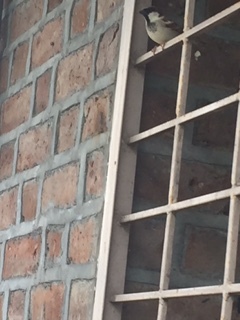I enjoy watching the lives of birds, and to that purpose my home is designed so I can follow their activity. From a wide kitchen window above a sink and counters, I observe them as they drink water, freshened twice daily, and bathe. A nearby neem, of pinnately compound leaves populating supple branches, has ballooned into an airy bird sanctuary providing different species a perch apart.
Daily I have been sweeping out neem twigs from a corner of my open-air porch that fronts the kitchen. House sparrows are searching out a site for nesting. But high, flat brick walls prevent that. The porch’s iron security grid provides perches close to my kitchen activities that they seem comfortable with—sometimes even, one will land on the grid over the window and dart its head back and forth, seemingly looking around inside.
As soon as I moved in eight years ago, house sparrows found my home. The branches of the six-foot, scantily leafed, front neem wouldn’t yet support birds, but the porch grid provided perches. These friendly birds were my welcomers. As the sparrows became my company in an isolated location at the back of an undeveloped field, I observed them—and my learning about them continues.
House sparrows function as a family: male, female, and in season, an immature. When one takes a shallow bath in the low depth of water of a tin lid set out for birds, the other waits; occasionally there’s a watery flutter from two in together. Then on the grid, they puff up, preening, tubby as marshmallows.
During my week of sweeping out neem debris, for the first time I observed ferociousness on the part of one male house sparrow. At first, what I thought was a sparrow dangling a form from its beak ridiculously reminding me of a fish with a hook in its lip—was instead a sparrow dangling the form of an intruder house sparrow who was having his head repeatedly jabbed onto the rung above by the beak of a male house sparrow. Obviously, the attacking house sparrow had grabbed a beakful of feathers, as its owner was swaying when I looked. The helpless sparrow, finally escaping, flew off, and the remaining pair nonchalantly resumed preening.
“Instinct governs the animal world; intellect, humans.” These are the first two of the seven states of the evolution of consciousness.*
“Instinct is the automatic response of the organism to a stimulus. . . . one that preserves the physical safety of the organism or its young. . . . Intellect is the faculty which allows human beings to solve complex problems.”* What I had been observing for years was instinct that I had instead been seeing through my intellect as friendliness, faithfulness, and my view of the house sparrows as fascinating. Both states had come together in my experience.
My realization is, “There are levels of knowledge to be plumbed in experience when curiosity thrives.”
* Speaking to three early followers, Meher Baba, Avatar of the Age, “explained in detail with a diagram the process of creation, evolution, reincarnation, and involution of consciousness. At the end . . . Baba told them all not to think too much on any of these details, stating, ‘Love is greater than anything—any amount of knowledge or explanations.”’
http://www.lordmeher.org/rev/index.jsp?pageBase=page.jsp&nextPage=1270
* http://www.lordmeher.org/rev/index.jsp?pageBase=page.jsp&nextPage=2154
* http://www.insightfulinnovations.com/zykrblog/understanding-evolving

